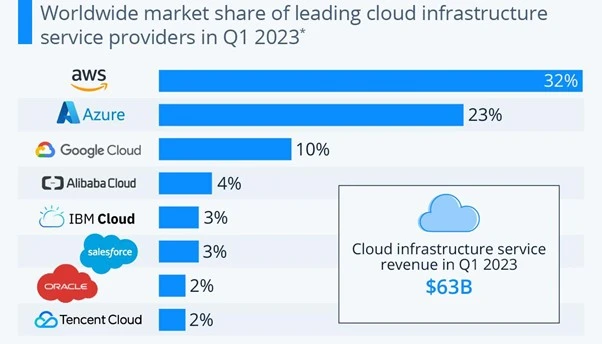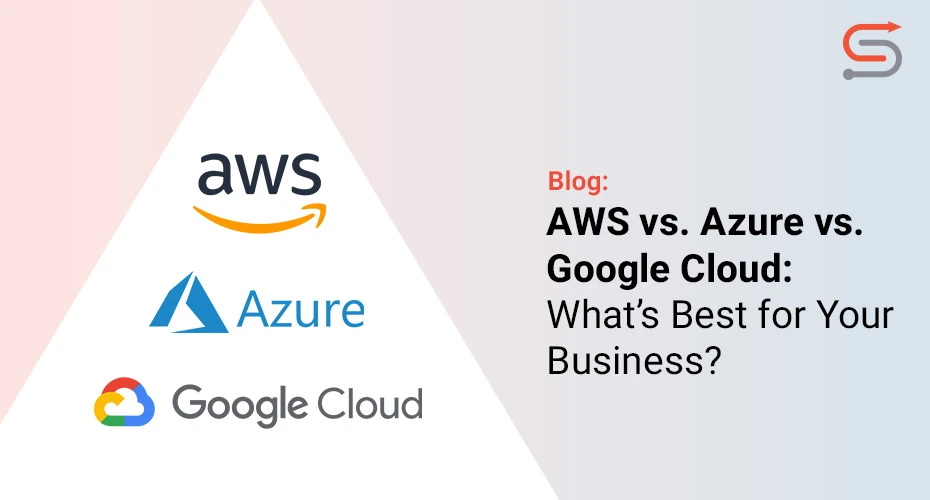August 7, 2023 - by Darren White
Cloud adoption is no longer just a fad or a competitive differentiator; it is a catalyst and driver for successful, long-term business transformation. Although many organizations have been apprehensive about the data security of and in the cloud, modern cloud vendors are constantly thwarting growing concerns via the latest security features and updates. This leaves even the most heavily regulated organizations without worrying about data security or compliance breaches.
What Are the Top Three Public Cloud Vendors?
The global cloud computing market is steadily growing at a CAGR of 14.1%, with reports expecting it to be worth $1.5 trillion by 2030. Rising efforts towards digital transformation and the continued shift to the hybrid work model are prime drivers of this growth. Cloud computing also enables enterprises to expand their business across geographies – without physically setting up an office.
While several new cloud providers are constantly entering the cloud space, the three giants, Amazon, Azure, and Google, continue to maintain their market position. Offering a host of new-age services and capabilities, these top-tier cloud vendors have established a great reputation.

But when it comes to choosing one over the other, the decision is not easy. So, who’s winning the battle in the enterprise cloud market? Let’s take a look!
1. AWS
The public cloud market has been dominated by AWS since the very beginning. Even today, it is the market leader, offering a comprehensive range of reliable, scalable, and cost-effective computing services. Established in 2006, Amazon’s services, such as EC2, Lambada, Lightsail, Aurora, DynamoDB, and S3, make it an extremely sought-after platform for developers, data scientists, and solution architects.
2. Azure
Launched in 2010, Microsoft Azure provides organizations with intelligent, cloud-native innovations, allowing them to build what they want, where they want it. They can create secure, future-ready cloud solutions using numerous on-premises, hybrid, multi-cloud, and edge options. Today, Azure’s OpenAI, Dev Box, Virtual Machines, DevOps, and Machine Learning Services are extremely sought-after by businesses across industries.
3. Google Cloud
Google Cloud offers several modern cloud capabilities, allowing businesses to build apps faster, make smarter decisions, and foster collaboration. Since its launch in 2011, this public cloud platform has been a popular choice for organizations across telecommunications, media, retail, and software companies. Today, Google offers over 150+ cutting-edge computing, storage, AI, database, analytics, and networking products.

AWS vs. Azure vs. Google Cloud – A Comparison
As the cloud becomes a core driver for transformation and success, it is no longer a question of whether to opt for cloud but which platform to choose. Although the market is mushrooming with hundreds of vendors, here’s a comparison of the top three providers:
AWS |
Azure |
|
|
|---|---|---|---|
Key Strengths |
|
|
|
Top Capabilities |
|
|
|
Availability Zones |
99 availability zones | 113 availability zones | 109 availability zones |
Storage Options |
An array of storage options, including Elastic Block Store (EBS), Elastic File System (EFS), Simple Storage Service (S3), Storage Gateway, FSx, and File Cache. | Several storage options, including Azure Data Lake, Azure Data Lake Gen1, Data Share, Table, Archive, Avere vFXT, Blob, Disk, and Elastic SAN. | A range of cloud storage options, including Standard, Nearline, Coldline, and Archival storage. |
Compute Capabilities |
Tailorable and serverless compute capabilities, including AWS Lambada and AWS Fargate, with several application integration and data storage options. | Highly capable Azure, Linux, and Windows Virtual Machines, SQL Servers, CycleCloud, Quantum, Azure Kubernetes Service (AKS), Azure Service Fabric, and Azure Container Instances. | Scalable and highly customizable Compute Engines such as Tau VMs, C3, E2, N2, N2D, NI, and several compute- and memory-optimized machines. |
Industry Capabilities |
Advertising and marketing, financial services, game tech, education, automotive, consumer packaged goods, energy, government, healthcare, industrial, manufacturing, media and entertainment, nonprofit, power and utilities, retail, semiconductor, sports, telecom, and travel and hospitality. | Financial services, government, healthcare, manufacturing, retail, energy, media and entertainment, and gaming. | Retail, consumer packaged goods, manufacturing, automotive, supply chain and logistics, energy, healthcare, and life sciences, media and entertainment, games, telecom, financial services, capital markets, banking, insurance, payments, government, and education. |
Biggest Customers |
|
|
|
AWS vs. Azure vs. Google Cloud: The Final Verdict
Choosing the right public cloud platform for your business can be a herculean task. But here are some tips:
- If you’re looking to opt for a cloud with the widest range of functionality and maturity, AWS is the perfect choice.
- If quick deployment, cost-effectiveness, and user-friendliness are your core requirements, Microsoft is a true winner.
- And if you’re looking to leverage cutting-edge analytics and cloud-native capabilities, Google Cloud is your best bet.
Remember, no cloud is better than the other: the decision you make depends on which cloud platform best fits your organization’s unique needs.
If you’re ready to reap the benefits of a cloud infrastructure or need help in deciding which model is best suited for your organization, explore our Cloud Advancement Services today!
Contributor’s Bio
Darren White serves as the Practice Director, Cloud Advancement at Synoptek, bringing 25 years of professional experience to his role. At Synoptek, White is responsible for the growth and strategic direction of the company’s public cloud practices and oversees cloud-related development, cloud center of excellence, sales campaigns, solution offerings and cloud operations.

